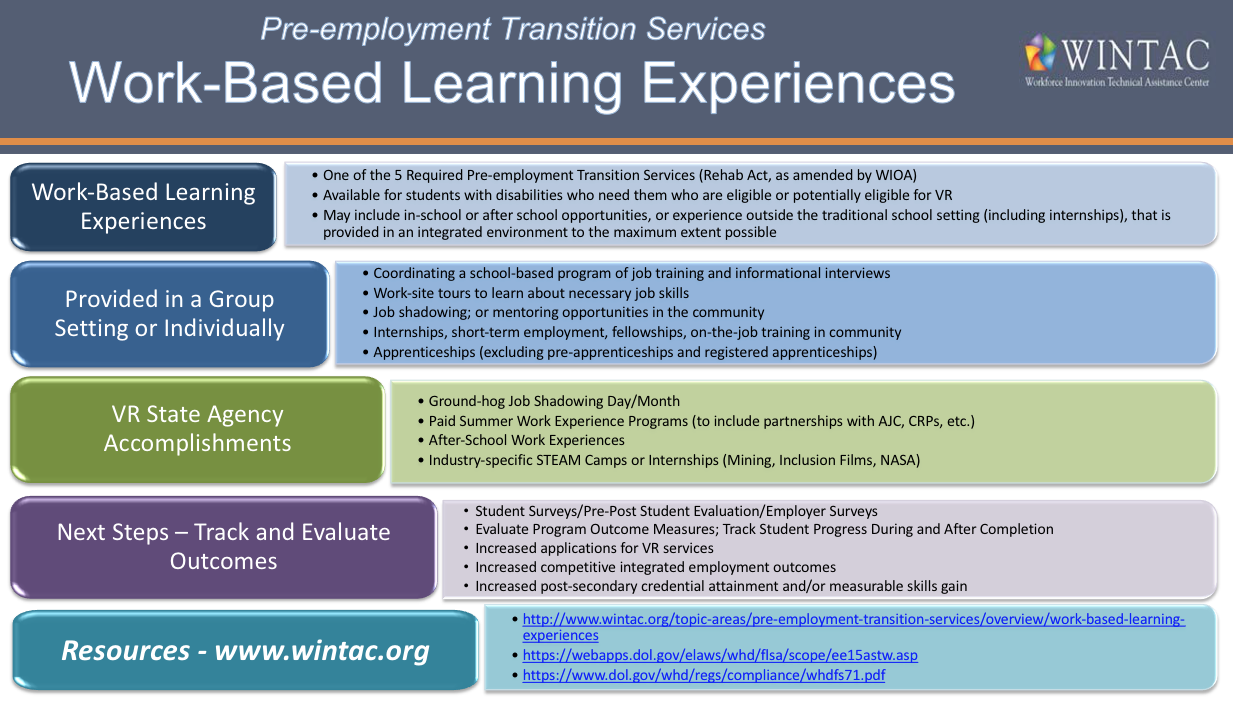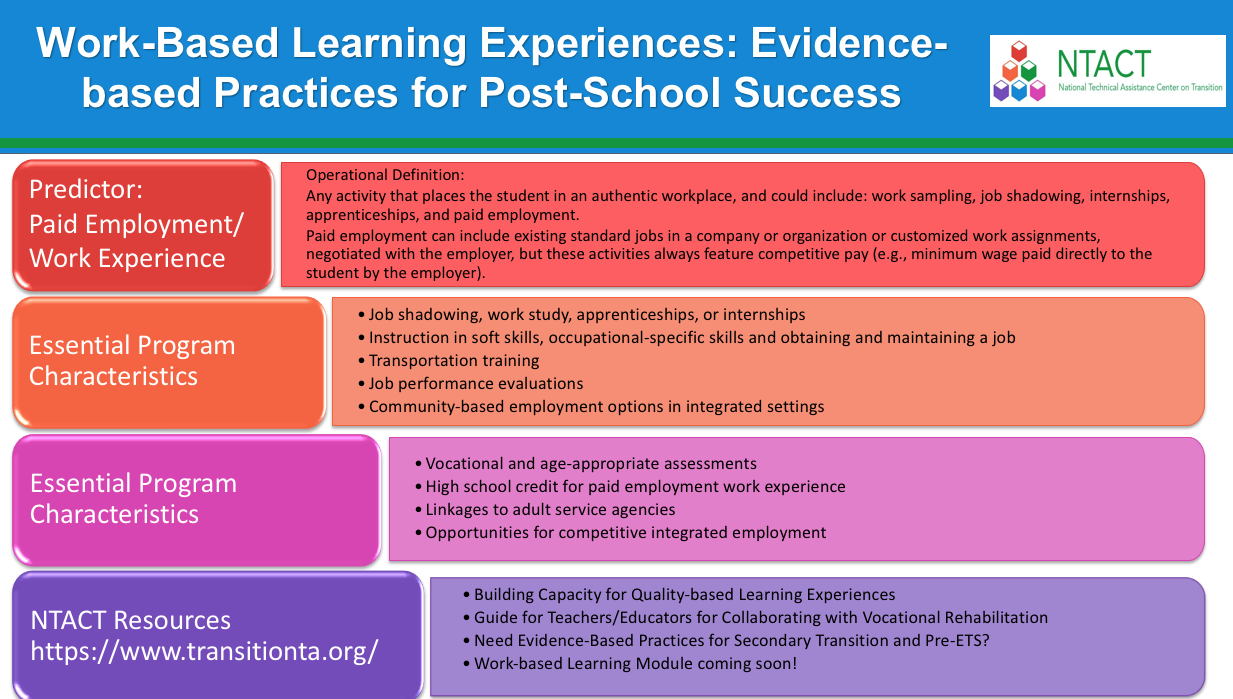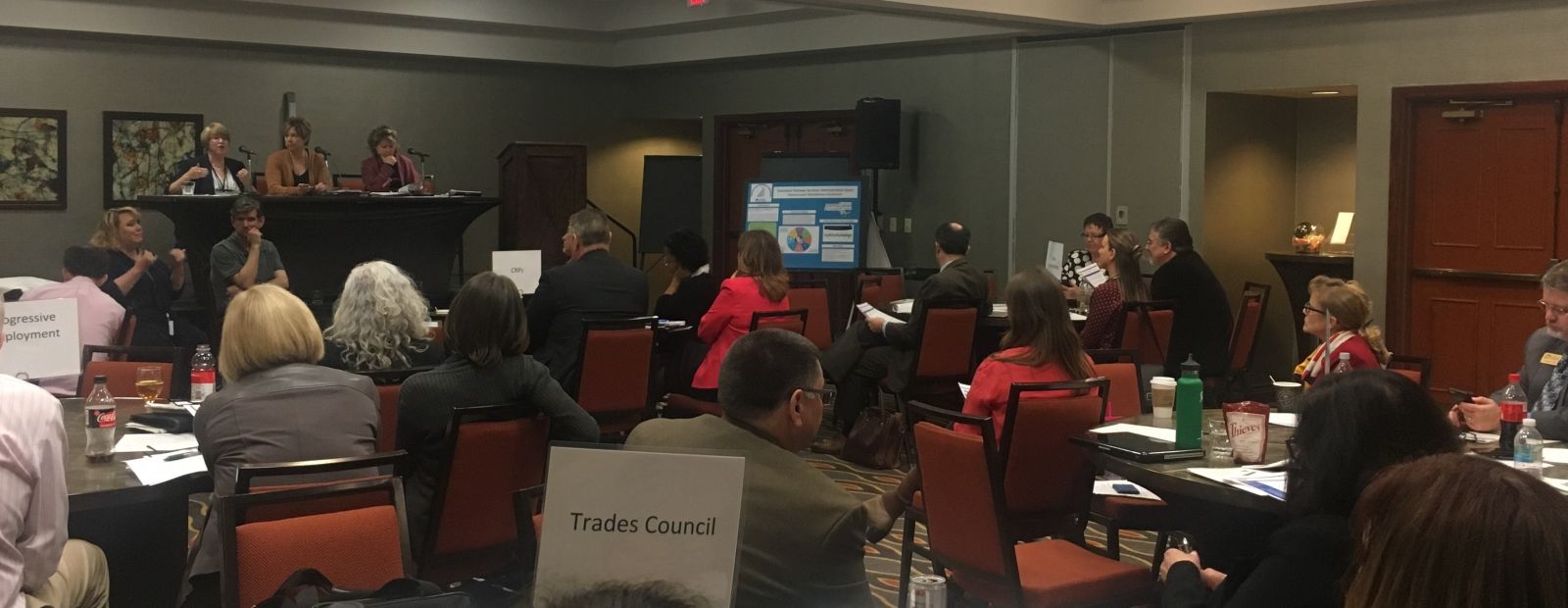Inclusive Work-Based Learning Forum Report:
On the Job Training, Apprenticeships, and Beyond
The Job-Driven VR Technical Assistance Center hosted an in-person forum titled “Inclusive Work-Based Learning: On the Job Training, Apprenticeships, and Beyond” on March 14th –15th, 2018 in Dallas, Texas. The forum stimulated discussions with representatives from over 19 states on a variety of inclusive work-based learning topics such as: leadership in developing programs, perspectives from Vocational Rehabilitation (VR) candidates and businesses, state-level planning, and cross-state connections between VR and workforce partners.
Effective work-based learning models expose participants to work opportunities in various career fields, while reinforcing and enhancing their academic learning. Key work-based learning models include internships, pre-apprenticeships, apprenticeships, and registered apprenticeships.
In addition to state VR agency representatives, the forum invited staff from technical assistance centers to share their perspectives on work-based learning initiatives, and featured states who implemented innovative practices that led to increased employment outcomes for individuals with disabilities. This brief highlights the work-based learning initiatives presented at the forum.
Technical Assistance Centers
The Rehabilitation Services Administration (RSA) has funded a number of training and technical assistance centers (TACs) to assist state vocational rehabilitation (VR) agencies and their partners in providing VR and other services to people with disabilities. Two of the technical assistance centers are specific to services for transition age youth with work-based learning strategies being an area of focus.
Pre-Employment Transition Services: The Workforce Innovation Technical Assistance Center
 The Workforce Innovation Technical Assistance Center (WINTAC) attended the forum and led discussions with attendees around building their capacity to provide effective work-based learning experiences for VR consumers. The WINTAC specifically focused on work-based learning experiences as one of the five required Pre-employment Transition Services, as reflected in the Workforce Innovation Opportunity Act (WIOA).
The Workforce Innovation Technical Assistance Center (WINTAC) attended the forum and led discussions with attendees around building their capacity to provide effective work-based learning experiences for VR consumers. The WINTAC specifically focused on work-based learning experiences as one of the five required Pre-employment Transition Services, as reflected in the Workforce Innovation Opportunity Act (WIOA).
Work-based learning opportunities are available for eligible or potentially eligible students with disabilities and may include in-school or after school opportunities or experience outside the traditional school setting.
The WINTAC recommended that work-based learning experiences be provided in competitive integrated settings to the maximum extent possible, occur in an individual or group setting, and incorporate activities such as:
- Coordinating a school-based program of job training and informational interviews
- Work-site tours to learn about necessary job skills
- Job shadowing; or mentoring opportunities in the community
- Internships, short-term employment, fellowships, on-the-job training in community
- Apprenticeships (excluding pre-apprenticeships and registered apprenticeships)
The WINTAC commended state VR agencies on their success in initiating many paid work experiences for VR consumers, such as: Ground-hog Job Shadowing Day/Month, paid summer work experience programs (including partnerships with American job centers, community rehabilitation providers, etc.), after-school work experiences, and industry-specific science, technology, engineering, arts, and mathematics (STEAM) camps and internships.
The WINTAC advised that VR agencies track and evaluate outcomes of paid work experience initiatives. Suggested evaluation measures include:
- Student surveys/pre-post student evaluation/employer surveys
- Evaluate program outcome measures; track student progress during and after completion
- Increased applications for VR services
- Increased competitive integrated employment outcomes
- Increased post-secondary credential attainment and/or measurable skills gain
Improving Postsecondary Outcomes for All Students with Disabilities: National Technical Assistance Center on Transition
 The National Technical Assistance Center on Transition (NTACT) attended the forum and led discussions focused on building capacity for quality work-based learning programs for post-school success. The NTACT defined paid work experiences as any activity that places the student in an authentic workplace, and could include: work sampling, job shadowing, internships, apprenticeships, and paid employment.
The National Technical Assistance Center on Transition (NTACT) attended the forum and led discussions focused on building capacity for quality work-based learning programs for post-school success. The NTACT defined paid work experiences as any activity that places the student in an authentic workplace, and could include: work sampling, job shadowing, internships, apprenticeships, and paid employment.
Paid employment can include existing standard jobs in a company/ organization or customized work assignments as negotiated with the employer. These activities always feature competitive pay of at least minimum wage paid directly to the student by the employer.
NTACT described essential paid work experience program characteristics as including:
- Job shadowing, work study, apprenticeships, or internships
- Instruction in soft skills, occupational-specific skills and obtaining and maintaining a job
- Transportation training
- Job performance evaluations
- Community-based employment options in integrated settings
- Vocational and age-appropriate assessments
- High school credit for paid employment work experience
- Linkages to adult service agencies
- Opportunities for competitive integrated employment
The NTACT directed attendees to a number of online resources at https://www.transitionta.org/ , including information on building capacity for quality-based learning experiences, a guide for teachers/educators for collaborating with VR programs, and evidence-based practices for secondary transition and pre-employment transition services.
Work-Based Learning Promising Practices at the State and Local Level
The Transition Work-Based Learning Model Demonstrations
The Rehabilitation Services Administration (RSA) funded work-based learning model demonstrations in VR programs to identify and demonstrate innovative practices that ultimately lead to improved post-school outcomes for students with disabilities. Each of the RSA grantees were awarded funds in the Fall of 2016 to continue over the course of five years. Three VR agency grant awardees attended the forum: Maine Bureau of Rehabilitation Services, Massachusetts Rehabilitation Commission, and the Vermont Division of Vocational Rehabilitation. Each of the state VR programs shared information about their model implementation success, challenges, and overall impact.
Maine Bureau of Rehabilitation Services: The Transition Work-Based Learning Model Demonstration Grant
The Maine Bureau of Rehabilitation Services (BRS) is also implementing the progressive employment model as a transition-focused model to provide effective work-based learning experiences (at least 2 per student) in coordination with other transition services, including pre-employment transition services and customized employment. The goal of this initiative is to ensure that students with disabilities are prepared for postsecondary education and competitive integrated employment. Other project goals include:
- Assisting 400 students in the transition years within two years of graduation with engagement in career exploration activities including paid work-based learning opportunities.
- Evaluating the effectiveness of rapid engagement activities of Progressive Employment and the Leadership and self-advocacy skills of JMG.
- Developing replicable, sustainable and collaborative ways to provide pre-employment transition services.
- Increasing rates of graduation from high school, post-secondary education/training and competitive integrated employment.
Massachusetts Rehabilitation Commission: Transition Pathway Services Demonstration Grant
The Transition Pathway Services (TPS) Demonstration Grant develops a coordinated set of services provided by community partners including vocational rehabilitation, career centers, independent living centers, pre-employment transition vendors and local educational authorities to increase employment and/or post-secondary education opportunity for students with disabilities.
The ten services components in the TPS model include:
- 2 Work Based Learning Experiences
- Vocational Counseling
- Workplace Readiness Training
- Benefits Counseling
- Assistive Technology
- Transportation Coordination
- Vocational Assessments
- Peer Mentoring
- Customized Job Placement
- Family Support Transition Planning
Transition Pathway Services believes if students have access to a coordinated Career Discovery Team of transition services that this can improve academic and career planning along with skill development that will lead to improvements in employment outcomes and postsecondary educational opportunities. Through TPS efforts, students will have a more seamless transition planning process preparing them for life after high school.
Vermont Division of Vocational Rehabilitation: Linking Learning to Careers
The Vermont Division of Vocational Rehabilitation’s Linking Learning to Careers (LLC) program’s eligibility and enrollment standards are high school sophomores and juniors on or eligible for an individual education plan (IEP) or 504 Plan. Their target is to enroll 800 students statewide over 2 years – 400 students each in the control and treatment groups.
LLC is designed to achieve these student outcomes:
- Being employed and succeeding in a paid, competitive job that is a stepping-stone to a career.
- Being enrolled in & succeeding in a postsecondary program that will lead to a career.
- Having confidence, on the part of the students & their families, that they will achieve their career goals.
To get there, LLC will deliver:
- Career development support via classroom, small group, & one-on-one services resulting in an individual LLC Plan.
- A variety of work-based learning experiences including: at least one job shadow, at least one unpaid internship, and at least one competitive, integrated, employer-paid job.
- Access to postsecondary education, including earning college credit while still in high school.
- Intensive, individualized assistive technology support.
- Transportation for work-based learning, employment & college activities.
Forum Materials
Agenda & Attendees
- View the forum agenda for March 14-15th: /sites/explorevr.org/files/files/Work%20Based%20Learning%20Forum%20Agenda.docx
- Download the attendee list: /sites/explorevr.org/files/files/WBLF%20Participant%20List%20(1).docx
Posters
- JDVRTAC Toolkit: Julisa Cully, Project Director, Institute for Community Inclusion, University of Massachusetts: https://www.explorevr.org/toolkits/customized-training-toolkit
- WINTAC: Brenda Simmons, Senior Research Associate, the George Washington University: /sites/explorevr.org/files/files/New_Revised%20WBLEPoster_2_27_18.pptx . [Text-Only]
- NTACT: Ruth Allison, Senior Research Associate, TransCen and Caroline MaGee, Senior Research Assistant/TA Provider, University of Oregon: /sites/explorevr.org/files/files/NTACT_WBL_Poster_2Mar18_FINAL.pptx [Text-Only]
- NASTAD: Patrick Reardon, President, National Association of State and Territories Apprenticeship Directors: /sites/explorevr.org/files/files/Poster%20(1).pptx
- Model Demonstration Projects:
- Maine: Liz Nitzel, Transition Work Based Learning Grant Manager, Maine DVR: /sites/explorevr.org/files/files/TWBLMPPTFinal.pptx [Text-Only]
- Massachusetts: Jennifer Stewart, Statewide Transition Director, Massachusetts Rehabilitation Commission: /sites/explorevr.org/files/files/TX%20Poster%20Session-%20FINAL.pptx [Text-Only]
- Vermont: Brian Guy, Assistant Director, Linking Learning to Careers, VocRehab Vermont: /sites/explorevr.org/files/files/LLC%20Poster%20for%20Dallas%20Conference.pptx [Text-Only]
- VR Workforce Studio: Rick Sizemore, Director, Wilson Workforce and Rehabilitation Center and Chris Hall, Manufacturing Technician, Hershey Chocolate: /sites/explorevr.org/files/files/VR-poster24x36.pptx [Text-Only]
- Registered Apprenticeships Overview: Thomas Hooper, Project Director, Jobs for the Future: /sites/explorevr.org/files/files/JDVRTAC_Apprenticeship%20Poster_24x36_072017_bh4.pdf
Presentations
- Work-Based Learning Promising Practices: WINTAC: /sites/explorevr.org/files/files/Revised_Complete_WINTAC_TA_Map_2_27_18_revised%20(1).pdf
- Pre-Apprenticeship at Arkansas Career Training Institute: Jonathan Bibb & Karen Breshears: /sites/explorevr.org/files/files/Pre-Apprenticeship%20at%20Arkansas%20Career%20Training%20Institute-March%202018(1).pptx
- Step-by-Step Apprenticeship Implementation Guide Overview: /sites/explorevr.org/files/files/STEP-BY-STEP%20APPRENTICESHIP.pptx
This forum was funded by RSA grant # H264A140002 .


